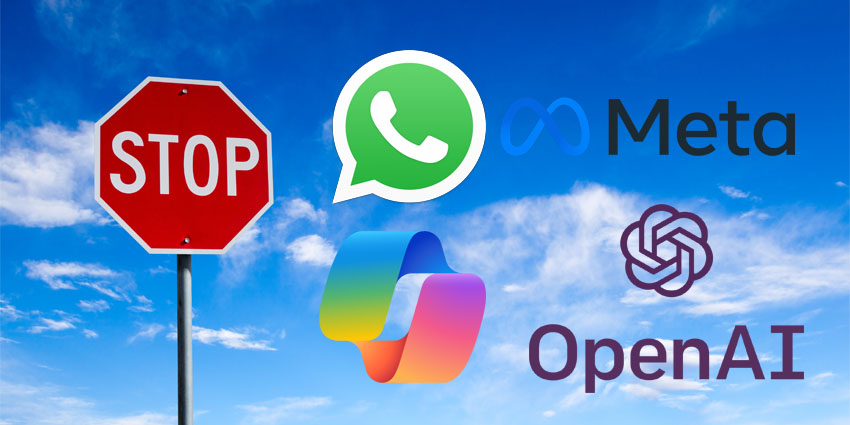When Meta announced changes to its WhatsApp Business Solution terms of service in October, the implications for enterprise AI strategy might not have been immediately apparent. Now, as OpenAI and Microsoft confirm that their ChatGPT and Copilot chatbots will exit WhatsApp by January 15, 2026, technology buyers face a compressed timeline to evaluate alternatives, assess business impact, and execute migration strategies, or accept Meta AI as their sole option for WhatsApp.
The policy change signals more than a basic platform tweak. For organizations that have embedded ChatGPT or Copilot into WhatsApp-based workflows, whether for internal knowledge management, distributed team support, or rapid information access, this development should galvanize a fundamental reassessment of multi-channel AI deployment strategies and the hidden risks of platform dependency in critical business systems.
Understanding Meta’s WhatsApp Policy Distinction Around Copilot and ChatGPT
Meta’s updated terms draw a clear line that organizational decision-makers must understand. According to a Meta spokesperson speaking to TechCrunch, “The purpose of the WhatsApp Business API is to help businesses provide customer support and send relevant updates. Our focus is on supporting the tens of thousands of businesses who are building these experiences on WhatsApp.”
In practice, businesses may continue deploying AI-powered customer service chatbots through WhatsApp’s Business API, provided the AI serves the business’s own customers. What Meta now prohibits is using WhatsApp as a distribution channel where the AI chatbot itself constitutes the product being delivered. Organizations that use ChatGPT or Copilot for internal productivity or offer AI assistant access to customers as a value-added service face inevitable disruption.
Beyond OpenAI and Microsoft, other third-party AI chatbot providers, including Perplexity, face the same restrictions. By January 2026, Meta AI will be the only general-purpose AI assistant accessible through WhatsApp, creating a de facto monopoly for that specific channel.
The Vendor Lock-In Calculation: Meta and WhatsApp Without Copilot and ChatGPT
Meta’s move to leverage its platform dominance raises questions about vendor dependency. WhatsApp’s global penetration is unmatched, quietly establishing itself as the most popular enterprise communications platform, especially in markets outside North America, where it serves as the primary means of communication. In Latin America, India, and much of Europe, WhatsApp is basically essential.
This creates a complex calculus for tech buyers. If your workforce or customer base relies fundamentally on WhatsApp, switching to Meta AI may represent the path of least resistance, even if ChatGPT or Copilot better serves your technical requirements. The alternative, moving users to different platforms for AI interactions, introduces change management challenges and potential productivity losses during transition.
What IT Leaders and Tech Buyers Could Do Now
Organizations should approach this decision systematically rather than reactively. A structured evaluation could include: quantifying current dependencies. Which teams and workflows currently rely on ChatGPT or Copilot through WhatsApp? What is the business impact if those capabilities disappear without replacement? Without a clear understanding of what’s at stake, prioritization becomes a matter of guesswork.
Evaluate Meta AI thoroughly. Conduct hands-on testing with representative use cases from your organization to ensure optimal performance. Assess integration complexity with existing systems. Determine whether Meta AI’s capabilities, performance, and reliability meet your requirements. If gaps exist, quantify their impact on the business.
Model alternative architectures. For workflows that cannot be transitioned to Meta AI, what alternative access methods are available? Could ChatGPT or Copilot be deployed through Microsoft Teams, Slack, or dedicated applications? What is the cost and complexity of maintaining parallel systems?
Assess regional variations. WhatsApp’s criticality varies by geography. Your strategy for operations in Mexico or India may differ substantially from your approach in the United States or Canada.
Finally, plan change management proactively. Platform transitions fail more often due to inadequate user preparation than technical shortcomings. Communication strategies, training programs, and support resources should be planned well in advance of the January deadline.
Building Resilient AI Strategies
This episode illustrates a broader strategic principle where organizations that concentrate critical capabilities on a single platform face an elevated risk when market dynamics shift. The organizations that navigate this transition most effectively will treat it not as an isolated platform change but as an opportunity to strengthen their broader approach to AI strategy, vendor management, and platform risk.







